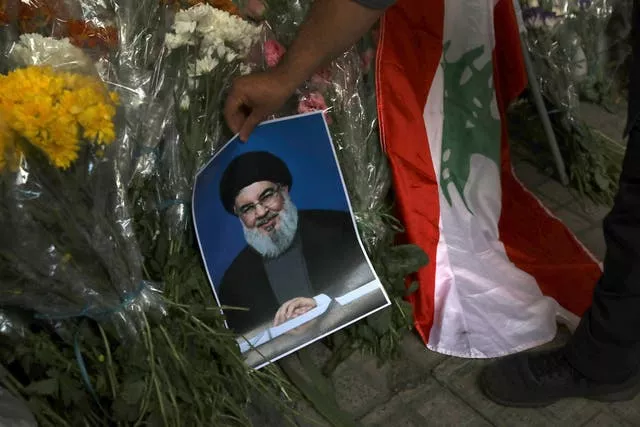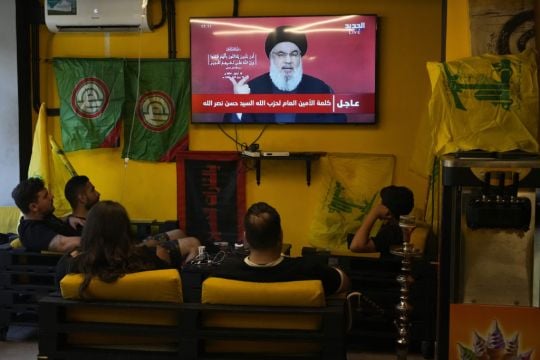The leader of Hezbollah has vowed to keep up daily strikes on Israel despite this week’s mass bombing attack on its communication devices, and said Israelis displaced by the fighting from homes near the Lebanon border would not be able to return until the war in Gaza ends.
Hezbollah and Israel launched fresh attacks across the border as Hassan Nasrallah spoke for the first time since the deadly device bombings he described as a “severe blow” — and for which he promised to retaliate.
Nasrallah said the group has formed committees to investigate how the attack over two days that wounded thousands happened.
And he vowed the group would emerge stronger and continue its daily strikes into northern Israel.
As he spoke Israel said two of its soldiers were killed by the latest Hezbollah strikes across the Lebanon border.
His comments came as Israeli Defence Minister Yoav Gallant said Hezbollah ‘will pay an increasing price’ as Israel seeks to return residents to its north.
“Our goal is to ensure the safe return of Israel’s northern communities to their homes. As time goes by, Hezbollah will pay an increasing price,” said Mr Gallant.
“The sequence of our military actions will continue.”
Nasrallah described the past two days as “harsh” saying: “Yes, we were subjected to a huge and severe blow.” He vowed Hezbollah would recover.

Nasrallah said: “The enemy crossed all boundaries and red lines. Some of the explosions took place in hospitals, pharmacies, clinics, homes, cars and streets where many civilians are present.”
He added that as a result of “this aggression dozens were killed including women and children and thousands were wounded”.
“When they detonated all these pagers their aim was to kill 4,000 human beings at the same time.
“This was the intention of the enemy and the level of crime they have reached,” he said.
“Over two days and in one minute on Tuesday and in one minute on Wednesday the Israeli enemy was aiming to kill 5,000 in two minutes without any boundaries,” Nasrallah said.
“We will call them the massacres of Tuesday and Wednesday,” he said.

As Nasrallah spoke in a televised speech from an unknown location, Hezbollah and the Israeli military traded new strikes over the border.
Israeli war planes flew low over Beirut and broke the sound barrier, sending birds flying in panic and people in their houses and offices rushing to open the windows to avoid the glass shattering.
Israel also launched attacks in southern Lebanon on Thursday, saying it struck dozens of missile launchers and other Hezbollah infrastructure, though it was not immediately clear if there were any casualties.
Fears are rising that 11 months of exchanges of fire between the two sides will escalate into all-out war, particularly after this week’s unprecedented bombings around Lebanon and in Syria, detonating hundreds of pagers and walkie talkies used by Hezbollah.
At least 37 people were killed and some 3,000 wounded in the explosions, which appeared to be the culmination of a monthslong operation by Israel to target as many Hezbollah members as possible all at once but also hit civilians.
The attack came as Israeli leaders warned that they could launch a stepped-up military operation against Hezbollah, saying they are determined to stop the group’s fire to allow tens of thousands of Israelis to return to homes near the border.

Nasrallah vowed that Hezbollah will keep going on with its attacks along the border with Israel as long as the war in Gaza continues.
“The Lebanese front will not stop before the aggression on Gaza stops,” he said.
Speaking to Israeli troops on Wednesday, Mr Gallant said: “We are at the start of a new phase in the war — it requires courage, determination and perseverance.”
He made no mention of the exploding devices but praised the work of Israel’s army and security agencies, saying “the results are very impressive”.
Mr Gallant said that after months of fighting Hamas in Gaza, “the centre of gravity is shifting to the north by diverting resources and forces.”
Hezbollah said earlier on Thursday it had targeted three military positions in northern Israel near the border, two of them with drones.
The Israeli military said the drones crashed near communities. Hospitals reported they treated at least eight patients lightly or moderately injured. The military said early on Thursday it had struck several militant sites in southern Lebanon overnight.

The volley of strikes was a signal by Hezbollah that it would continue its near daily fire, which it says is a show of support for Hamas. Israel’s 11-month-old war with Hamas in Gaza began after its militants led the October 7 attack on Israel.
Israel has responded to Hezbollah’s fire with strikes in southern Lebanon, and has struck senior figures from the group in the capital Beirut. The exchanges have killed hundreds in Lebanon and dozens in Israel and forced the evacuation of tens of thousands of residents on each side of the border.
Israel and Hezbollah have repeatedly pulled back from an all-out war under heavy pressure from the United States, France and other countries.
But in their recent warnings, Israeli leaders have said they are determined to change the status quo dramatically.
Israel began moving more troops to its border with Lebanon on Wednesday as a precautionary measure, Israeli officials said. Israel’s army chief, Lt Gen Herzi Halevi, said plans have been drawn up for additional action against Hezbollah, though media reported the government has not yet decided whether to launch a major offensive in Lebanon.
Lebanon is still reeling from the deadly device attacks of Tuesday and Wednesday.
The explosions have rattled anxious Lebanese fearing a full-scale war. The Lebanese Army said it has been locating and detonating suspicious pagers and communication devices, while the country’s civil aviation authorities banned pagers and walkie-talkies on all airplanes departing from Beirut’s international airport until further notice.
The attack was likely to severely disrupt Hezbollah’s internal communication as it scrambles to determine safe means to talk to each other.
Hezbollah announced the death of five combatants on Thursday, but did not specify if they were killed in the explosions or on the front lines.
The blasts went off wherever the holders of the pagers or walkie-talkies happened to be in multiple parts of Beirut and eastern and southern Lebanon — in homes and cars, grocery stores and cafes and on the street, even at a funeral for some killed in the bombings, often with family and other bystanders nearby.
Many suffered gaping wounds on their legs, abdomens and faces or were maimed in the hand. Tuesday’s pager blasts killed 12 people, including two children, and wounded some 2,300 others. The following day’s explosion killed 25 and wounded more than 600, Health Minister Firas Abiad said, giving updated figures.
Mr Abiad told reporters that Wednesday’s injuries were more severe than the previous day as walkie-talkies that exploded were bigger than the pagers. He praised Lebanon’s hospitals, saying they had managed to deal with the flood of wounded within hours.
“It was an indiscriminate attack. It was a war crime,” he said.
Later on Thursday, French President Emmanuel Macron expressed “deepest concern” that the bombings in Lebanon will contribute to “a dangerous escalation of tensions in the region,” according to a statement from the French presidency.

Mr Macron’s comments come after the French leader, who aims to keep France as an important diplomatic player in Lebanon, spoke on the phone to the country’s top political and military officials.
The French president urged them to “act responsibly in order to avoid an escalation.”
He also asked them to “send messages of restraint to all Lebanese parties, starting with Hezbollah,” the statement added.
Mr Macron will speak about the dangers of an escalation with the Israeli prime minister, the statement also said, adding that “all parties must act to avoid war”.
In Washington, the State Department urged U citizens in Lebanon to maintain a low profile and review their security awareness.
In alerts sent to the American community in Lebanon on Tuesday and Wednesday, the US Embassy in Beirut repeated existing advice to consider leaving the country and reiterated the State Department’s warning against all travel to the country.
The head of the World Health Organisation (WHO) said it is working with Lebanon’s Health Ministry as it deals with those wounded by exploding communications devices.
WHO director-general Tedros Adhanon Ghebreyesus said the strikes have “severely disrupted Lebanon’s already-fragile health system”.
He said WHO has distributed trauma and emergency surgery supplies and: “We are working to meet immediate needs, including blood supplies and blood-testing kits, and monitoring how the health system is functioning.”
He told reporters in Geneva on Thursday that WHO has been helping Lebanon to prepare for mass casualty events, such as through training of more than 5,000 health workers, covering more than two-thirds of the country’s hospitals.
Later on Thursday Israel accused Iran and Hezbollah of bombarding millions of Israelis with threatening text messages.
Israel’s National Cyber Directorate said a flood of Hebrew-language text messages popped up on mobile phones nationwide, falsely purporting to be a communication from the Israeli Home Front Command.
The government said roughly five million suspicious SMS texts were sent to Israelis late on Wednesday. It determined that Iran and Lebanon’s Hezbollah hacked an Israeli mobile service provider and exploited its customer accounts. The Israeli government did not say which provider.
“Say goodbye to your loved ones,” read one of the messages seen by the Associated Press. “Don’t worry, you will hug them in hell.”
There was no immediate response to the Israeli allegations from Hezbollah or Iran.







